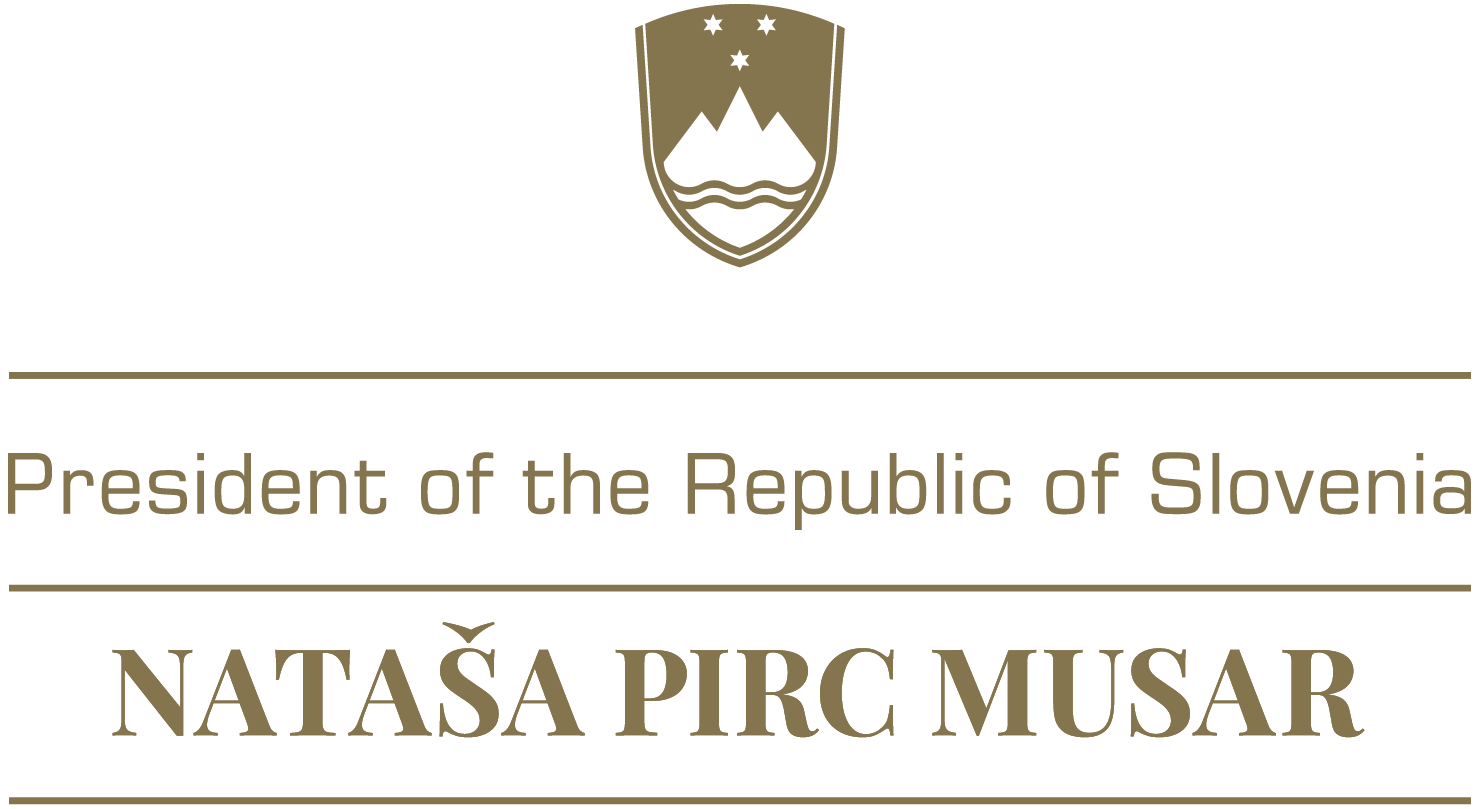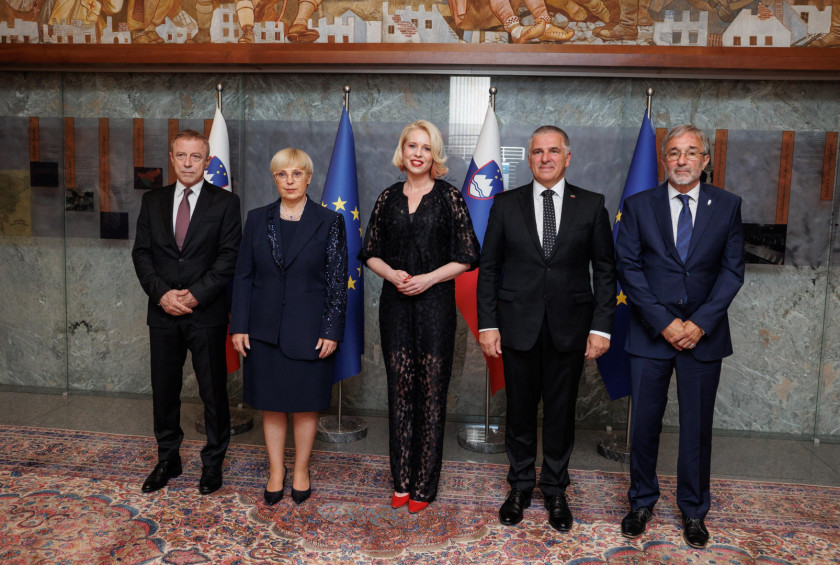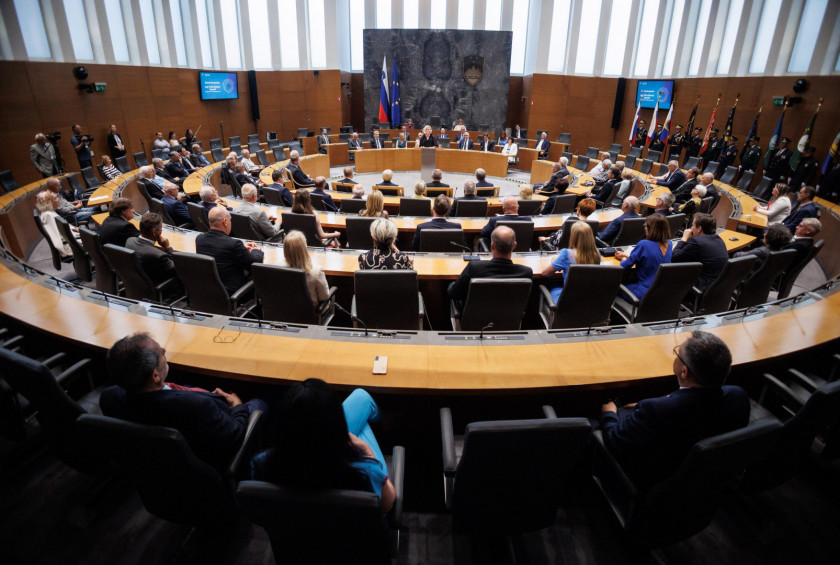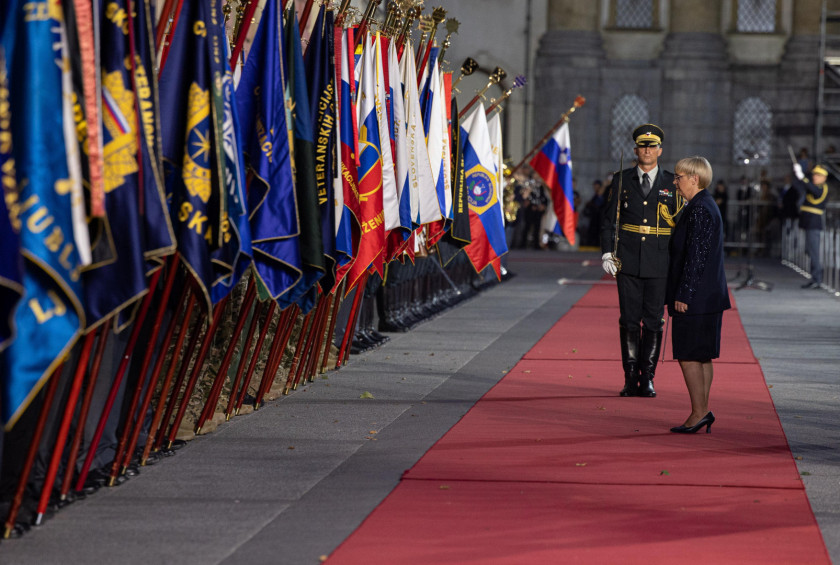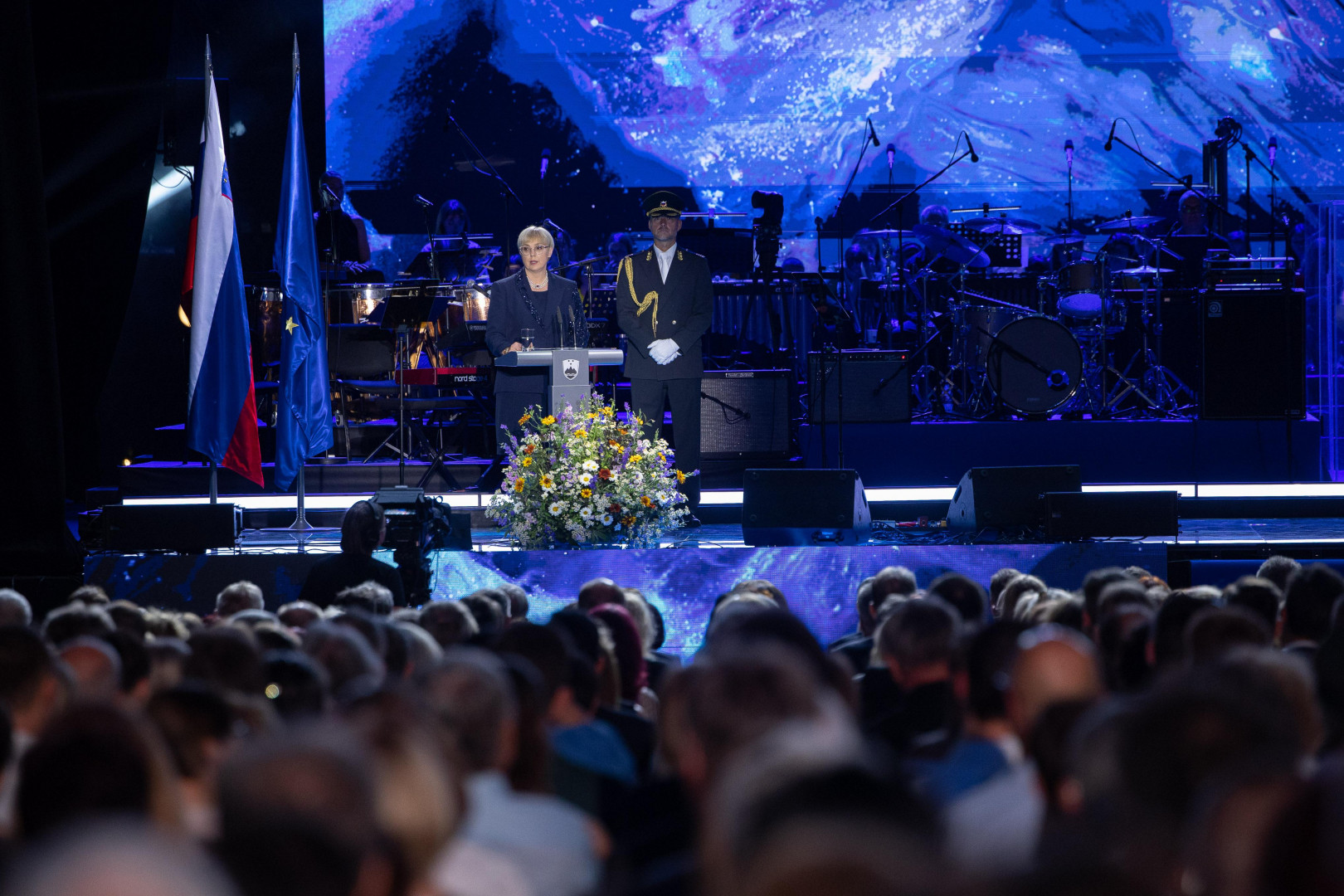
Photo: Katja Kodba/Slovenian press agency
Address by the President of the Republic of Slovenia Nataša Pirc Musar at the State Ceremony on the occasion of the Statehood Day
The President of the Republic of Slovenia, Nataša Pirc Musar attended the central national ceremony of Statehood Day. The President of the Republic of Slovenia was the keynote speaker at the ceremony.
Kongresni trg, Ljubljana, 24 Jun 2025
Dear Slovenians, both home and abroad, citizens and residents of the Republic of Slovenia, ladies and gentlemen,
The Slovenian people achieved their dream of an independent state 34 years ago. Since then, we have had different visions and ideas about our country, but one wish unites us all – for Slovenia to be respected at home and abroad. But respect must be earned. We can succeed in this, but only if each and every one of us acts with responsibility. Responsibility to the past, responsibility to the present, responsibility to the future.
The word 'responsibility' carries several meanings. From the perspective of Slovenia’s development – the Slovenia we want and deserve – responsibility means respecting and implementing our Constitution. In everyday life, responsibility is the guiding principle and foundation of a community based on solidarity. In relation to our national history and the history of the international community, however, responsibility also means a duty not to forget.
Slovenia is a young country, which makes this duty to remember all the more important. The fact that we proudly sing the Slovenian national anthem all over the world today is a privilege not all nations enjoy. For this, we owe a debt of gratitude to the fighters for Slovenian independence. Without the police and territorial defence forces, without our brave individuals who resolutely opposed Yugoslav politicians and army with all they had, including their lives, we would have never embarked on the path to independence and statehood. But the story of our struggle is much longer. It is therefore also our responsibility never to forget all those compatriots who fought and gave their lives for Slovenia over the centuries, nor the fighters of the national liberation movement who resolutely and courageously resisted the occupiers during the Second World War. Without all of them, it would be unthinkable – even in theory, let alone in practice – to assert that we, as a people and as a nation, can shape our own future.
The responsibility to remember also means ensuring a dignified burial for the victims of post-war killings. The goal we are striving for has not yet been achieved, but it is within sight. We are aware of our responsibility to finally realise the right of every person to burial and a grave. So let me say it once again: let us take this step. Let us take a step that does not represent a victory for one politician, one party or one coalition. A dignified burial should be our second Slovenian independence. The emancipation of personal memory from everyday politics and the politicisation of Slovenian wartime and postwar history. By providing a dignified burial as the fulfilment of our responsibility, we will mature as a country and as a community.
Ladies and gentlemen,
Unfortunately, shortly after the end of Second World War, it became apparent that its horrors and promises of "never again" were quickly forgotten by many. Even after the end of the Cold War, more than four million people have died in armed conflicts around the world. The number of victims, especially civilians, continues to rise, and there is no end to the aggression. We are rightly concerned about the serious regional and even global consequences of these conflicts.
The start of Russia's aggression against Ukraine meant that, for the first time since Second World War, Europe is once again experiencing a war of conquest. This war is not merely a display of force by a permanent member of the United Nations Security Council that flouts international law. This war also brings back dark memories of the early 20th century – a path that led to the two greatest atrocities in human history. The war in Ukraine claims the lives of thousands of soldiers on both sides every day. Countless civilians are dying – and we already know, or strongly suspect, that this is sometimes happening in horrific circumstances. Many countries, including Slovenia in the United Nations Security Council, draw attention to these atrocities and many others taking place around the world on a daily basis.
Just as many countries drew attention to the crimes committed in the former Yugoslavia in the early 1990s. This year marks the thirtieth anniversary of the genocide in Srebrenica. The genocide in our immediate vicinity. The wounds remain unhealed, and the crimes have not been forgotten. At that time, we were appalled that the international community stood, watching in silence. And in doing so, essentially condoned this inconceivable crime. It is true that the wheels of justice have put many people behind bars, even the worst criminals. But only after the genocide had already happened. No one can bring back the murdered fathers, brothers and sons to their grieving families.
War crimes and crimes against humanity, even the most heinous, are still being committed. For instance, in Sudan and Myanmar. Many innocent people die every day, hidden from the eyes of the world. Their cries go unheard, while – in stark contrast – we watch live coverage of the genocide in Gaza and crimes committed against Palestinians in the West Bank.
Gaza is becoming not only a synonym of inhumanity, but also a symbol of the destruction of the foundations of international law. Who among us could have thought that one day a prosecutor and several judges of an international criminal court would be sanctioned simply for doing their job and prosecuting those responsible for crimes against humanity? Who among us could have thought that the Secretary-General of the United Nations would be declared persona non grata? And this is solely because he stands in defence of the founding charter of the United Nations. A document born out of the ashes of the horrors of Second World War. A document that gives a face to the humanity that we, as an international community, should strive for; a document that 193 countries have signed – so that the evil that happened 80 years ago and more will never happen again. And this 'never again' belongs to us all. Because humanity is indivisible. This is why we must raise our voices and speak out. Every day. Every hour. Every minute. Let this slaughter of Palestinians come to an end – let the genocide in Gaza end. Let us not wait until it has run its course!
Responsibility for the future must also be our guiding principle if we are to face and overcome the challenges ahead as a respectful, inclusive, developed and progressive community. Politics must serve the people and set an example for them. It must strengthen their trust in the rule of law. In the fact that their voices are being heard. In the system of checks and balances. Politics must consistently demonstrate that transparency and inclusion are values, not problems. That is why, in Slovenia, we must take seriously all the problems and obstacles we encounter in building and maintaining such a community, fostering inclusive dialogue and a high political culture.
There are five such problems that are worth noting.
The first is the disregard for the clearly expressed will of the people as voiced in a referendum. This is illustrated by the introduction of preferential voting, which was supported by more than 70 percent of voters but has still not come into effect a year later. The voters have spoken. They want greater influence over who will decide and lead the country on their behalf. The Constitution is clear: in Slovenia, power is vested in the people, not in whichever government or opposition happens to be in office. It is therefore reasonable to expect our directly elected representatives to honour the will of the people and implement it in a responsible manner.
The second challenge is lack of transparency. We struggle with it on a regular basis. Sometimes we successfully overcome it. By cancelling the referendum on the construction of the Nuclear Power Plant 2, the political leadership has sent the right message to the people. The debate on our nuclear future will, of course, continue – based on data and analysis, with clearly defined consequences of our decisions. This does not, however, apply only to nuclear energy. Tomorrow, new and financially demanding projects will be on the table. Slovenia has committed to significantly increasing its investment in its defence capabilities. This also means the purchase of military equipment and technology, which will place an additional burden on the national budget.
But let there be no doubt. Investing in Slovenia's defence capabilities is a responsible course of action. It is required by the geopolitical situation in the region and changes in traditional allies and alliances. Europe must learn to stand on its own two feet in terms of defence and security. We must be prepared. Prepared for the possibility that, as in the past, we may first have to provide for our own security and protect our homeland ourselves. Yet the power of a community lies not only in how well it is armed. The power of a community lies also in how united it is. It is therefore important for all of us to send a political message that the social and other rights of Slovenia's citizens will not suffer as a result of investment in defence. This is precisely why transparency in decision-making is so important: what are we buying with public money? How are we buying it? What are we buying it? And at what cost?
The third challenge Slovenia faces is the clash between meritocracy and partitocracy. The practice of appointing people not on merit but on party loyalty – the idea that it doesn’t matter who you are, only that you are “one of us” – has long been recognised by the public as a serious problem. We must take this seriously, because such behaviour has negative consequences for the development and stability of our community. The efforts and ability of decision-makers to find and implement a compromise ensuring that all responsible positions in the country are filled by the best people are in the public interest and in the interest of us all. Only in this way will Slovenia be able to realise its potential and advance among the most successful countries. Otherwise, we will never catch up with those who have already recognised the importance of meritocracy for the progress of society and have successfully incorporated it into the functioning and governance of their countries.
The fourth challenge relates to attitudes toward the climate crisis. It is as if, in the whirlwind of geopolitical uncertainty in which we find ourselves, we have grown weary and forgotten about the overheating climate. However, the climate crisis is here. We must not forget that we need to adapt to it seriously and responsibly.
So far, we have mostly discussed the climate crisis in terms of its consequences, such as natural disasters, but it is crucial to address its causes. It is not an easy task, but it is an extremely responsible one. The climate crisis and environmental protection in general are far too complex issues to be subordinated to narrow political, economic or local interests. Building and maintaining a country and community that is capable of confronting the climate crisis is our shared responsibility.
The fifth challenge that we must seriously address if we want to live in a well-governed, developed and inclusive country is the justice system, which is an important pillar of the balance of power in a democratic political system. Not everything is perfect in our justice system, and critical assessment of its work must be ongoing. This means solving problems in both the justice system and in legislation, which will enable a functioning rule of law and thus equal legal security for all. There should be no doubt about this. What is deeply worrying, however, is the increasingly aggressive public campaign to discredit the justice system and other institutions of the rule of law.
Unfortunately, it is often politicians who set the tone for this sweeping and indiscriminate discrediting of the judiciary. Motivated solely by their own interests, they abuse their prominence to convince the public that justice is only 'just' when it rules in their favour or in favour of their political allies and supporters. Such behaviour reflects a low level of political culture and is, to put it mildly, irresponsible. It leads to lawlessness. Such an environment is a breeding ground for radical measures and solutions characteristic of autocracies, rather than democratic societies we strive to live in. It is therefore essential to recognise the characteristics of autocratic leadership in countries that have, in the past, led to fascism and Nazism. Some of the telltale signs are the cult of an infallible leader, intolerance of difference, persecution of minorities and intellectuals, the subjugation of universities, rigging elections based on disinformation, and so on. These are all well-known signs of autocratic leadership, and we must not turn a blind eye to these increasingly obvious trends – even in Europe.
Ladies and gentlemen,
Europe is our home, but also our great concern. In addition to internal political divisions, the European Union's position in the global economy is also causing unease. The numbers are sobering. Europe is lagging behind China and also the United States. Mario Draghi's report offers proposals for measures that the European Union should take to strengthen its position in the international community. These proposals should be taken extremely seriously, but with careful consideration.
The European Union must become strategically independent and geopolitically influential, but at the same time it must preserve the foundations on which it was built. Let us remind ourselves: this unique union of states – of which Slovenia has been a proud member for more than two decades – is based on the values of freedom, democracy, equality, the rule of law, and respect for human dignity and human rights, including the rights of minorities. These values are shared by all Member States in a society in which pluralism, non-discrimination, tolerance, justice, solidarity and equality between women and men prevail. These values are enshrined in EU law. And only such a European Union is our European Union.
Ours because it also reflects our character. Slovenia is a community that invests in science, education, culture and sport. It is a community that cares for the elderly, promotes intergenerational solidarity, long-term care, and accessible health and social protection for all. It is a community that invests in the preservation of a healthy and clean environment. Of course, we cannot say that everything is perfect here. But if we want Slovenia to be safe and ready to defend its security by all means necessary, then we must also be clear about what we are defending. We are defending a country that enables free creativity and entrepreneurship, while ensuring that no one is neglected, marginalised, discriminated against or excluded. We are defending a community committed to strengthening the rule of law, respecting all human rights for all, effectively fighting corruption and tackling the climate crisis. Building, developing and maintaining such a community and such a country is the duty and responsibility of every politician, every party and every coalition. This is so that we may survive as a nation. This is so that we and future generations can be proud of Slovenia – our country – which so many admire for its beauty.
Ladies and gentlemen,
Current events around the world give us little cause for ease and laughter. And yet – we must not allow anyone to take that away from us. Ease and laughter are not just the best medicine, as they say. They are also a reflection of the self-confidence of a nation. A nation not living in uncertainty. Not being torn apart by the past and differences. A nation that knows what it wants in order to withstand. And our path forward is clear. We know that feelings of fear, chaos and lawlessness do not create an environment conducive to the development and realisation of our growth potential. What creates such an environment is economic prosperity, the scientific, cultural, sporting and other achievements of the Slovenian people, solidarity, care for others, the rule of law and responsibility.
As we will soon see on this stage, young people – including even the youngest among us – are showing us that we must look to the future with confidence and optimism. It is said that young people are the future. But that’s not the whole truth. Young people are shaping the world alongside us. Young people are the harbingers of the future. They often reveal the light where we see only darkness. What they will build, however, depends in many ways on the foundations laid by us, their elders. We are those who must set an example.
It is our responsibility to build and preserve a homeland and a world they can continue to strengthen and improve. Let us show them that we are willing and able to take responsibility. That we can talk to each other, adapt to each other, respect and include each other. Because responsibility is not a choice – it is the duty of us all. If we fail to live by it and believe in it, the freedom that we celebrate today may not be here tomorrow. Our actions today will be the history of tomorrow.
Thank you, and my sincere congratulations to you on the occasion of Statehood Day.
